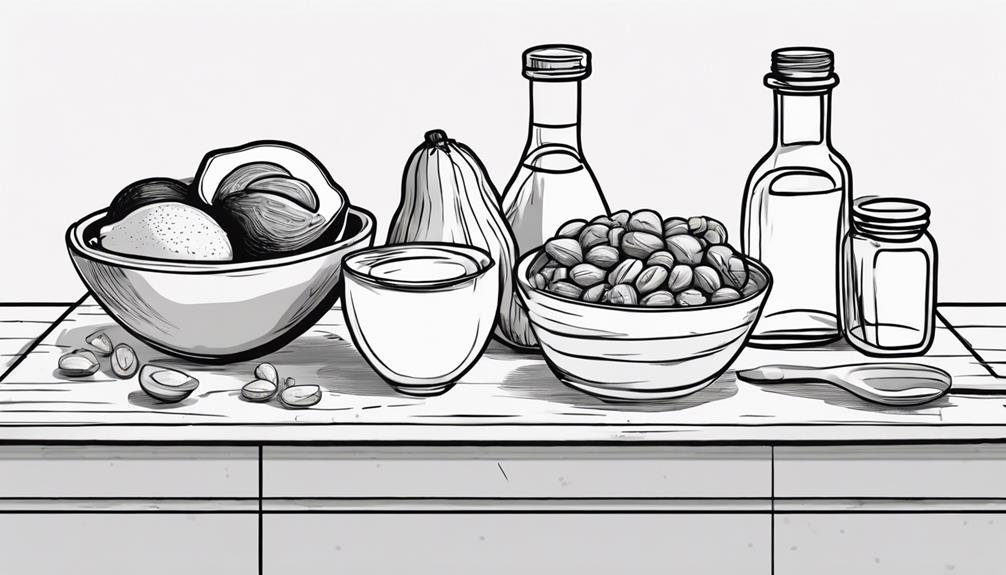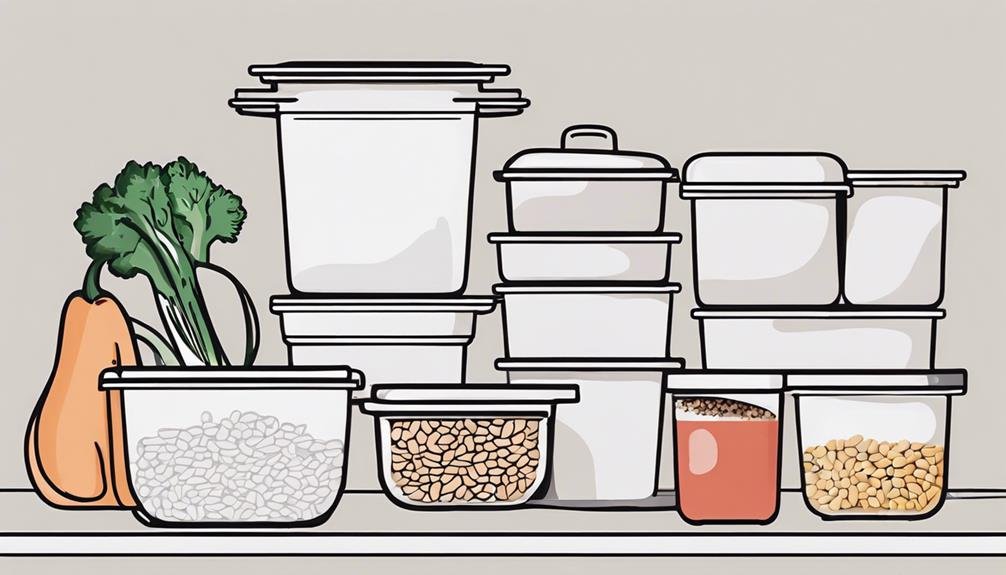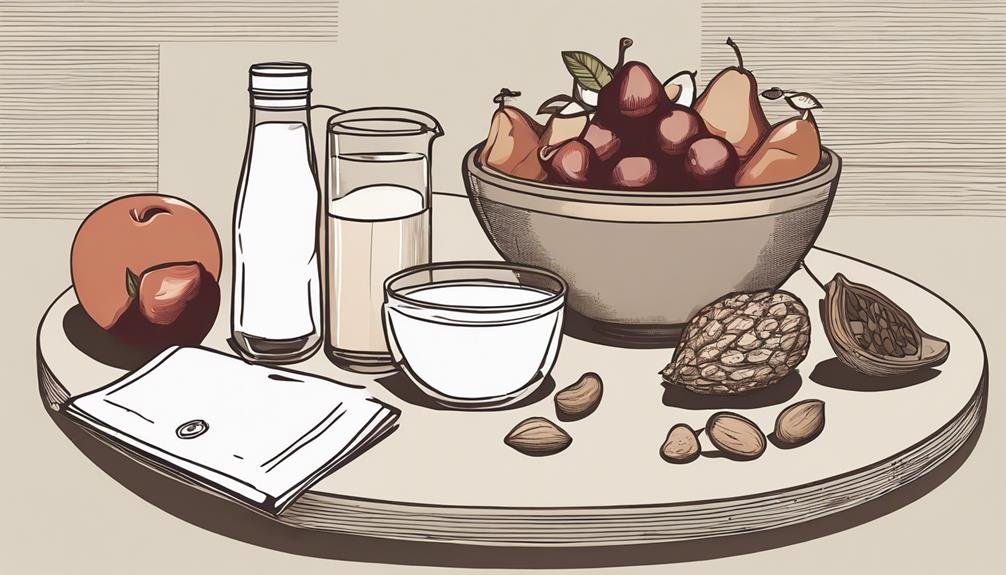10 Best Nutrition Tips for Older Male Fitness Enthusiasts
As an older male fitness enthusiast, your nutrition plays an essential role in your performance and well-being. Start by prioritizing protein intake, aiming for 1.2 to 2.0 grams per kilogram of body weight daily. Stay hydrated by drinking plenty of water and include hydrating foods like vegetables and fruits. Don't forget to incorporate healthy fats from sources like avocados and nuts. Focus on whole foods and emphasize fiber-rich options for better digestion. Manage your caloric intake wisely while limiting processed sugars. By paying attention to your micronutrient levels and supplementing wisely, you'll support your fitness journey. There's more to explore!
Key Takeaways
- Prioritize protein intake, aiming for 1.2 to 2.0 grams per kg of body weight daily to support muscle maintenance and repair.
- Stay hydrated by drinking at least eight 8-ounce glasses of water daily, adjusting for activity levels and incorporating hydrating foods.
- Incorporate healthy fats from sources like avocados and nuts to support energy levels and overall health.
- Focus on whole foods rich in nutrients, such as fruits, vegetables, and whole grains, to enhance overall health and reduce inflammation.
Prioritize Protein Intake
In order to build and maintain muscle mass as you age, it's crucial to prioritize protein intake in your diet. Aim for at least 1.2 to 2.0 grams of protein per kilogram of body weight daily.
Include high-quality protein sources like lean meats, fish, eggs, dairy, and plant-based options such as legumes and quinoa.
Spread your protein intake throughout the day by incorporating it into every meal and snack. This approach not only supports muscle repair and growth but also helps regulate appetite, making it easier to manage your weight.
Don't forget to take into account protein supplements if you struggle to meet your needs through food alone.
Stay Hydrated Daily
Alongside prioritizing protein, staying properly hydrated is essential for optimizing performance and recovery as you age. Your body's water needs increase with physical activity, and dehydration can lead to fatigue, decreased strength, and longer recovery times.
Aim to drink at least eight 8-ounce glasses of water daily, adjusting based on your activity level. Keep a water bottle handy during workouts to remind yourself to sip frequently.
Consider drinking water before, during, and after exercise, and don't wait until you're thirsty to hydrate—thirst is often a sign you're already dehydrated. Incorporate hydrating foods like fruits and vegetables into your meals, too.
Staying hydrated not only supports your workouts but also enhances your overall health and well-being.
Incorporate Healthy Fats

Incorporating healthy fats into your diet is fundamental for maintaining energy levels and supporting overall health as you age. Healthy fats, like those found in avocados, nuts, and olive oil, provide essential nutrients that help your body function at its best. They also promote heart health and can aid in joint mobility, important for your fitness routine.
| Healthy Fats | Benefits |
|---|---|
| Avocados | Rich in monounsaturated fats |
| Nuts (almonds) | Packed with protein |
| Olive Oil | Contains antioxidants |
| Fatty Fish | Omega-3s for brain health |
Focus on Whole Foods
Focusing on whole foods can greatly enhance your nutrition and overall well-being as you age. Whole foods, like fruits, vegetables, whole grains, lean proteins, and healthy fats, provide essential nutrients that support your body's needs.
They're packed with vitamins, minerals, and antioxidants, helping you maintain energy and muscle mass while reducing inflammation. When you choose whole foods, you also minimize processed ingredients that can contain unhealthy additives and excess sugars.
Aim to fill your plate with colorful produce, incorporate various protein sources, and select whole grains over refined options. By prioritizing whole foods, you'll not only nourish your body but also enjoy more satisfying meals, keeping you engaged and motivated in your fitness journey.
Manage Caloric Intake

Managing your caloric intake is essential for maintaining energy levels and supporting muscle health as you age. You want to strike a balance between consuming enough calories to fuel your workouts and avoiding excess that can lead to unwanted weight gain.
Start by calculating your daily caloric needs based on your activity level. Focus on nutrient-dense foods to maximize your intake without overloading on calories. Incorporate lean proteins, healthy fats, and plenty of fruits and vegetables into your meals.
Regularly monitor your weight and adjust your caloric intake as needed. Remember, it's not just about cutting calories; it's about making smarter choices that nourish your body while keeping your fitness goals in sight.
Optimize Meal Timing
To fuel your workouts and recovery effectively, timing your meals around your exercise schedule can make a significant difference in your performance and overall health.
Aim to eat a balanced meal containing protein, carbs, and healthy fats about two to three hours before your workout. This timing will provide you with the energy you need.
Post-workout, consume a protein-rich snack or meal within 30 minutes to aid in muscle recovery and replenish glycogen stores.
Staying hydrated is equally important; drink water before, during, and after your exercise.
Additionally, try to maintain a consistent meal schedule throughout the day, which helps regulate your metabolism and energy levels.
Emphasize Fiber-Rich Foods

Incorporating fiber-rich foods into your diet can enhance your overall fitness by improving digestion and maintaining steady energy levels throughout the day.
Aim to include a variety of whole grains, fruits, vegetables, legumes, and nuts in your meals. Foods like oats, quinoa, berries, and broccoli are excellent sources of fiber that help regulate your digestive system and keep you feeling full longer.
This can prevent overeating and support weight management, essential for your fitness goals. Additionally, fiber can help lower cholesterol levels and stabilize blood sugar, which is especially important as you age.
Limit Processed Sugars
Limiting processed sugars is essential for maintaining energy levels and supporting overall fitness as you age. These sugars, often found in snacks, sodas, and desserts, can lead to energy crashes and weight gain.
Instead, choose natural sources of sweetness like fruits, which offer vitamins and fiber along with their sugars. When grocery shopping, read labels carefully; you'll be surprised at how many products contain added sugars.
By cutting back on processed sugars, you'll improve your mood, enhance your focus, and reduce the risk of chronic diseases like diabetes and heart issues. Embrace whole foods and balanced meals that nourish your body and keep your energy steady.
Your body will thank you for making these smarter choices.
Supplement Wisely

Choosing the right supplements can greatly enhance your fitness routine and overall health as you age. Start by identifying your specific needs—whether it's muscle recovery, joint support, or heart health.
Protein powders can help maintain muscle mass, while omega-3 fatty acids support joint and cardiovascular health. Creatine may boost strength and endurance, making your workouts more effective.
Always consult with a healthcare professional before starting any new supplement to verify they're safe and suitable for you. Quality matters, so look for reputable brands that undergo third-party testing.
Monitor Micronutrient Levels
Monitoring your micronutrient levels is fundamental for maintaining ideal health and performance as you age.
As an older male fitness enthusiast, your body needs specific vitamins and minerals to support muscle function, bone health, and overall vitality.
Key micronutrients like vitamin D, calcium, magnesium, and zinc play significant roles in these areas.
Regularly check your levels through blood tests or consult a healthcare professional to identify any deficiencies.
Adjust your diet to include nutrient-rich foods such as leafy greens, nuts, seeds, and lean proteins.
Don't forget about supplementation if needed, but focus primarily on whole foods.
Keeping a close eye on your micronutrient intake guarantees you stay energized, recover efficiently, and continue to thrive in your fitness journey.
Questions
How Can I Improve Muscle Recovery After Workouts?
To improve muscle recovery after workouts, you should prioritize hydration, consume protein-rich foods, and get enough sleep. Stretching and incorporating rest days into your routine will also help your muscles recover more effectively.
What Are the Best Snacks for Post-Workout Recovery?
Ever wonder what fuels your recovery? For post-workout, grab a banana with peanut butter or Greek yogurt with berries. These snacks offer protein and carbs, helping your muscles heal and replenishing your energy effectively.
How Does Aging Affect Metabolism and Nutrient Absorption?
As you age, your metabolism slows down, making it harder to burn calories. Nutrient absorption also decreases, so you might need to adjust your diet to guarantee you're getting enough vitamins and minerals for peak health.
Can Intermittent Fasting Benefit Older Male Fitness Enthusiasts?
Intermittent fasting can be like a reset button for your body. It might enhance fat loss and improve insulin sensitivity, helping you stay fit. Just listen to your body and consult a professional before starting.
What Role Do Antioxidants Play in an Older Adult's Diet?
Antioxidants play an essential role in your diet by combating oxidative stress, reducing inflammation, and supporting overall health. Including fruits, vegetables, and nuts can enhance your well-being and help maintain energy as you age.
Conclusion
Incorporating these nutrition tips will supercharge your fitness journey as an older male enthusiast.
By prioritizing protein and staying hydrated, you'll boost your energy and performance, much like a gladiator preparing for battle.
Emphasizing whole foods and fiber-rich options will keep your body nourished and thriving.
Remember to limit processed sugars and supplement wisely to guarantee you're fueling your best self.
With mindful choices, you can enjoy a vibrant, active lifestyle well into your golden years.






